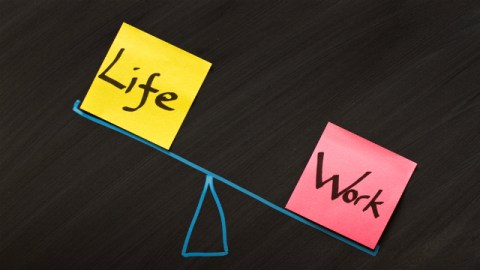Whose Responsibility is Work-Life Balance?

A conversation that could easily be taking place this very moment, somewhere in the United States…
A: Man, the French really have their priorities straight. Three months of vacation a year. Wine with dinner every night. None of this diet craziness or pathological sleep-deprivation. Kids aren’t all hopped up on Ritalin to finish five hours of homework a night . . .
B: Yeah… Look at their GDP.
A: GDP isn’t everything.
B: How do you suppose they’re going to afford three months of vacation a year and all that wine and cheese when their economy collapses?
A: Yeah. Well, at least when their economy collapses, they’ll have loving friends and family around them. And something more interesting to talk about than American Idol.
B: Snob.
A: Barbarian.
What’s the Big Idea?
Obviously, people’s priorities differ. But it’s fair to say that culturally speaking, the United States leans in the direction of intense productivity at the expense of time spent reading a good book, or in the company of friends and family. With an average of 14 days vacation given, 12 taken per year, the US is one of the most overworked (or hardworking, depending on your perspective) among developed nations. See this chart from Expedia’s 2011 Vacation Deprivation Survey:

It doesn’t take a PhD in psychology to realize that children fare better when they spend more time – especially in their early, most vulnerable years – with their parents or close relatives than with paid caregivers. Nor to see that punishing work hours and sleep deprivation add up to chronic stress, which can have negative psychological, social, and physical consequences.
Work-Life Balance and Women’s Careers
Nancy Calderon has the unwieldy and substantial title of Chief Administrative Officer and U.S. National Partner in Charge, Operations for KPMG America – an audit, tax and advisory services firm with over 23,000 employees and partners throughout the US. With over 24 years of leadership experience, she’s made it part of her professional mission to address issues that particularly affect ambitious women in the workplace.
Nancy Calderon on what businesses and employees can do to facilitate work/life balance:
We’ve come a long way, perhaps, since 1983’s Mr. Mom – whose comedy hinged on the idea that men taking care of kids is funny – but women are still significantly more likely than men to take time off from their careers to parent full-time, or to miss a work day to care for a feverish toddler.
In that sense, work/life balance has been viewed in the corporate world until very recently as a women’s issue, and has been the focus in recent decades of legislation aimed at reducing gender inequality in the workplace. Such efforts have focused on the responsibility of businesses to clarify and protect womens’ pathways to career advancement, as well as their right to raise and care for their children. Most notably, they’ve resulted in longer paid childbirth leave (at companies large, well-established, or progressive enough to support employee benefits).
Still, professional women (and the smaller percentage of men who take the lead in raising kids) find themselves passed over for promotion in favor of colleagues who are more “reliably” at the office, and many feel that while businesses are paying lip service to “work-life balance,” company culture – and American culture more broadly – isn’t really buying into it. Perhaps its the values of our Puritan forebears talking, but we still have a tendency to judge character in terms of hours worked.
What’s the Significance?
Nancy Calderon believes that work-life balance isn’t a women’s issue, but that women tend to suffer particularly heavily from guilt over their split responsibilities. Even after 24 years with her company, she still finds herself worrying what colleagues will think if she misses a morning meeting for a family obligation.
That part – the guilt – is something she advises women to work on abandoning, as it’s harmful to their sense of self-worth and professional efficacy, and because it’s something only they can control.
But businesses do have a responsibility, Calderon says, to establish programs that clearly define the pathways to promotion and account for variations in people’s schedules and responsibilities. The “My Pace” program she’s currently pitching at KPMG wouldn’t promote everybody at the same rate regardless of hours worked, but neither would it penalize employees of either gender for taking time off to raise or care for kids. Instead, it would clearly link promotion to hours worked and milestones achieved, and help employees to manage and balance their responsibilities to job and family.
Businesses can go even further, she says, toward helping employees manage work/life balance, by delivering on the internet’s promise of the mobile workplace – facilitating online meetings and allowing people to work from home when they need to.
Perhaps the only positive aspect of the 2008 economic downturn is that it forced many of us to reexamine our priorities – to question what really constitutes personal and professional fulfillment. At moments of crisis few people turn to business meetings for solace, or wish they could file just one more report. Now if only we can sustain that awareness as we rebuild and rethink the future of work, rather than returning reflexively to business as usual.
Follow Jason Gots (@jgots) on Twitter
Image credit: Shutterstock.com





